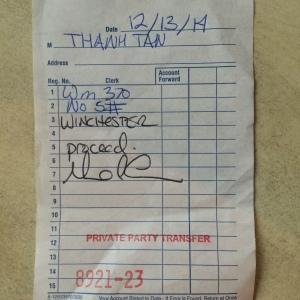I went with some friends to check out the first gun and knife show in Centralia since the roll-out of Initiative 594 on Dec. 4. The new law, passed overwhelmingly by a majority of voters, closes the “gun show loophole.” Under current federal law, background checks are required only for sales by licensed firearms dealers. I-594 expands those background checks to private transfers or sales, common to gun shows. “Remember to dress Lewis County and not Seattle-USC,” my friend text messaged me beforehand. I think I blended in just fine, other than the fact I was one of only two people of color there. At the entrance of the venue, a huge sign read “NO LOADED GUNS.” Security guards at the entrance provided zip ties to help people lock guns they wanted to bring inside to trade. For the full experience, I went through a free background checkafter eyeing a $300 Winchester shotgun. Bremerton-based Palmer Ordnance was there to run the background checks using the federal database. I filled out a private-party transfer information sheet and a federal Firearms Transaction Record known as Form 4473. We had a slight problem. The vintage gun I was interested in purchasing did not have a serial number. Someone brought it over from the dealer’s table. No digits anywhere, but that didn’t stop the process. They started the check; I was cleared almost instantly. To complete the trade, I would have to show the dealer this confirmation note:

Some of the wording in the new law could be clarified. But from my experience, I just don’t view the concept of background checks as a huge burden. Technically, I was not supposed to handle the firearm at all until the background check was complete and the seller was notified, but the gun had no ammunition and I probably looked harmless. In any case, there was no way anyone there was going to enforce the rule.
